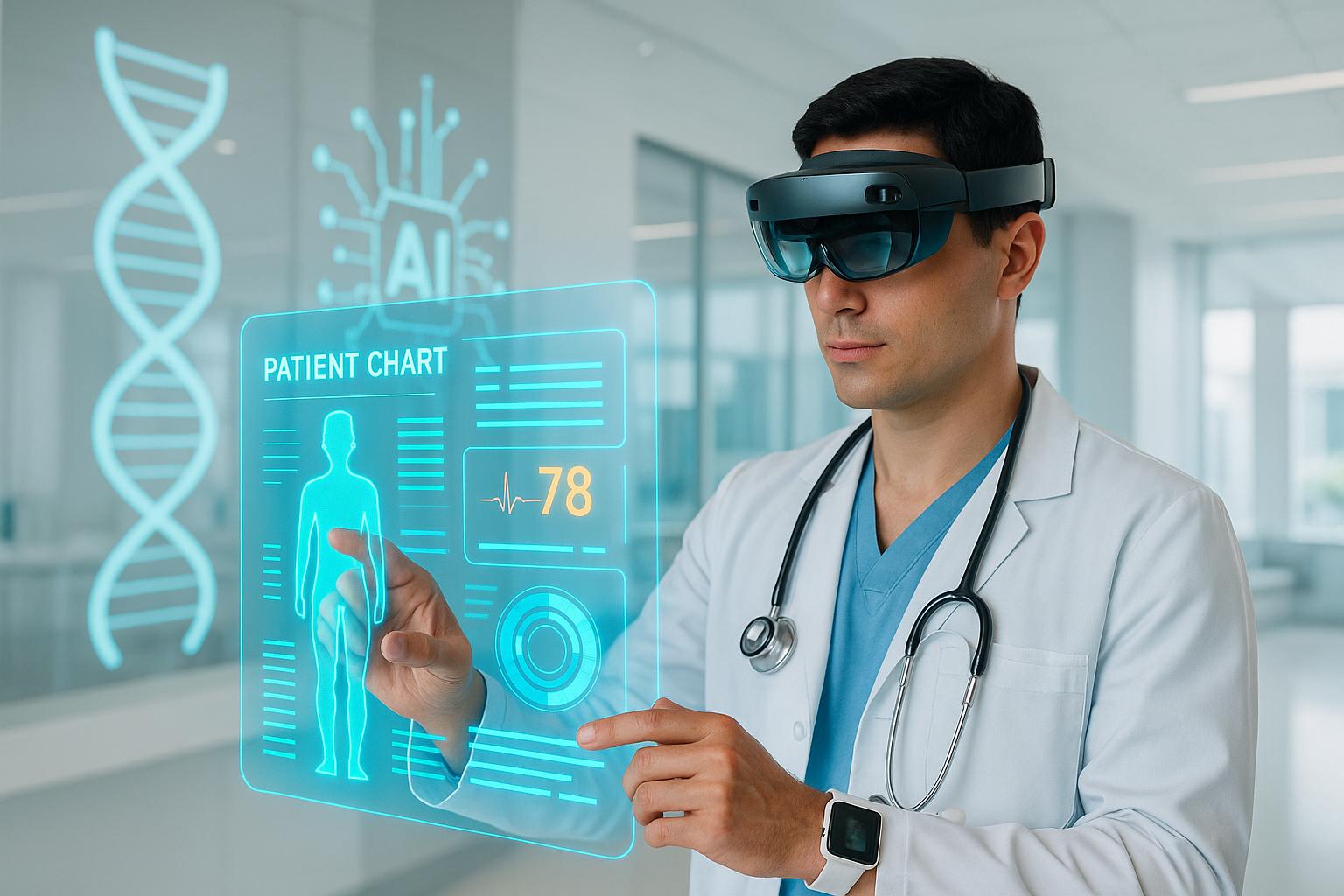Future healthcare jobs are being shaped by AI, transforming roles across patient care, operations, and support services. In this chapter of our 2030 Career Series, we explore the new skills, opportunities, and career paths that will define a smarter, AI-driven era of healthcare.
Here’s what you need to know:
- Job Growth: Healthcare jobs are expected to grow by 13% from 2021 to 2031, driven by increased demand for services and worker shortages.
- New Roles: Careers like AI medical trainers, health data analysts, and digital therapeutics specialists will emerge, blending technology with patient care.
- AI’s Impact: Artificial intelligence will enhance diagnostics, streamline operations, and create demand for professionals skilled in AI systems, data analysis, and algorithm auditing.
- Telehealth Expansion: Remote care coordinators will play a vital role in managing virtual care as telehealth usage continues to rise.
- Skills Needed: Professionals must combine technical expertise (e.g., AI, data tools) with interpersonal skills like empathy and teamwork.
- Education: Certifications, microcredentials, and specialized degree programs will be critical for staying competitive.
The healthcare industry is changing fast. Preparing now with the right skills and education will position you for success in these emerging roles.
The TOP Healthcare Jobs of The Future (HIGH Paying & High Growth!!!)
New High-Growth Healthcare Jobs by 2030
The healthcare industry is evolving rapidly, creating career opportunities that blend traditional medical expertise with advanced technology. These new roles highlight the growing influence of AI and data analytics, offering both job stability and competitive pay. Here’s a closer look at some of the most exciting positions shaping the future of healthcare.
Future Healthcare Jobs: New Career Opportunities
Artificial intelligence is transforming healthcare, paving the way for specialized roles like:
- Clinical AI trainers: These professionals work alongside healthcare teams to implement and fine-tune AI systems, ensuring they enhance patient care while bridging the gap between technology and medicine.
- Algorithm auditors: Tasked with monitoring AI systems, they identify biases and ensure compliance with regulatory standards.
- Synthetic data specialists: They create artificial datasets that mimic real patient data, safeguarding privacy while maintaining the integrity of statistical analysis.
Demand for AI expertise in healthcare is skyrocketing. A 2025 LinkedIn report revealed a 50% increase in demand for AI skills in healthcare over the past year. McKinsey projects that AI could contribute up to $1 trillion annually to the healthcare sector.
"IT departments will soon become the HR of AI agents, given how widespread and prevalent they will become", says Jensen Huang, Founder and CEO of Nvidia.
This integration of AI also underscores the growing importance of health data analysts, who turn raw data into actionable insights.
Health Data Analyst Jobs and Their Growing Importance
The healthcare data analytics market hit $31 billion in 2022, highlighting the need for future healthcare jobs that focus on transforming raw health data into meaningful insights. Health data analysts are in high demand as organizations increasingly rely on data-driven decisions to improve outcomes and reduce costs.
These analysts work with a variety of data sources, including electronic health records and wearable devices. Using tools like SQL and Tableau, they uncover trends to predict disease outbreaks, analyze population health, and identify patients at risk for readmission. Their role extends beyond technical skills — they must also explain complex findings to non-technical healthcare staff, acting as a bridge between clinical and technical teams.
Wearable health technology is adding another layer to this field, creating future healthcare jobs that require expertise in interpreting patient-generated data and integrating it with traditional health records. This shift is driving new opportunities for specialized education and training programs, shaping the next generation of healthcare careers.
Remote Care Coordinator Roles in Telehealth
Telehealth usage surged to 54% in 2024, driving demand for remote care coordinators. These professionals ensure patients receive seamless care, regardless of location, by managing the logistics of remote healthcare delivery.
Coordinators handle patient communication via video calls, secure messaging, and other digital platforms. They also troubleshoot technical issues, schedule virtual appointments, and coordinate care among multiple providers. Proficiency in telemedicine platforms, patient portals, and EHR systems is essential. Strong communication skills are equally critical, as coordinators often assist patients who may feel overwhelmed by technology or remote care processes.
Digital Therapeutics Roles: New Treatment Methods
The digital therapeutics market is on track to reach $32.5 billion by 2030, growing at an annual rate of 27.77%. This growth is fueling demand for roles focused on software-based medical interventions.
- Prescription app developers: These professionals design FDA-approved apps that provide evidence-based treatments. Their work requires expertise in programming and clinical trial methodologies.
- Behavioral intervention designers: By combining psychology, user experience design, and medical knowledge, they create interventions for mental health conditions like anxiety, depression, and substance abuse.
In October 2024, Click Therapeutics, Inc. introduced Software-Enhanced Drug therapies with its Click SE offering, marking a new era in prescription digital therapeutics. Meanwhile, technologies like virtual reality (VR) and augmented reality (AR) are opening doors to innovative treatments for phobias, chronic pain, and more.
"We will continue to advance and expand our efforts to strengthen state and federal policy, ensuring that telehealth is established as a permanent and essential modality of care. And, with DTA’s expertise influencing policies affecting innovative technologies, we are expanding our advocacy efforts to support digital health tools such as digital therapeutics, digital diagnostics, remote monitoring devices and artificial intelligence", explains Kyle Zebley, executive director, ATA Action and senior vice president, public policy at the ATA.
Roles in digital therapeutics require a mix of machine learning expertise and healthcare knowledge, along with the ability to collaborate across clinical, regulatory, and product teams. Success in this field — one of the fastest-growing areas of future healthcare jobs — depends on working closely with regulators, healthcare providers, and insurers to ensure new treatments are adopted and reimbursed.
As digital tools and AI continue to shape healthcare, these emerging roles demand a unique combination of technical and interpersonal skills, setting the stage for a new era in future healthcare jobs and careers.
Required Skills for 2030 Healthcare Jobs
The healthcare industry is undergoing rapid change, blending medical expertise with cutting-edge technology. To succeed in this evolving landscape, professionals must balance technical know-how with strong interpersonal abilities, all while navigating a data-driven environment.
"Everyone in every job is gonna generally be in a new job by 2030 ’cause the skills required for your job are gonna change at a fundamental level", says Aneesh Raman, LinkedIn’s Chief Economic Opportunity Officer.
The push toward artificial intelligence (AI) in healthcare is a major driver of this shift. Global AI investments are expected to surpass $1.8 trillion by 2030, and by 2025, around 97 million people are projected to work in AI-related roles.
Here’s a closer look at the essential technical and interpersonal skills needed for these future roles.
Technical Skills for Data-Based Healthcare
To thrive in a healthcare system increasingly reliant on data, professionals must master tools like machine learning frameworks (e.g., TensorFlow, PyTorch) and programming languages such as Python and R. These skills enable practitioners, including health data analysts, to transform medical data into actionable insights that improve patient outcomes.
For example, Amazon Comprehend Medical has streamlined the analysis of unstructured electronic health record (EHR) data, making it easier to extract critical clinical information.
A strong grasp of statistical modeling and health informatics is equally important. These skills help integrate AI tools into clinical workflows, interpret results in a patient care context, and meet regulatory standards. Clinical AI analysts, for instance, rely on these capabilities to collaborate effectively across interdisciplinary teams. Additionally, monitoring AI systems for biases across diverse populations is essential to maintain equity in care delivery.
People Skills for Technology-Focused Healthcare
While technical expertise is vital, human-centered skills remain equally crucial. Compassionate communication helps build trust as patients encounter advanced diagnostic tools and virtual care systems. Research from OHSU highlights this need:
"Clear communication habits and expressions of empathy are paramount in providing excellent patient-centered care".
Ethical AI use is another critical area. With 70% of healthcare providers identifying ethical concerns as a major hurdle in AI adoption, professionals must understand the moral, legal, and social challenges tied to AI in healthcare. This includes ensuring informed consent and safeguarding patient privacy.
Roles in digital therapeutics require navigating sensitive discussions about software-based treatments, helping patients understand AI’s role in their care without compromising trust. Similarly, virtual care coordinators must balance technical proficiency with empathy to manage diverse, remote patient populations effectively.
Teamwork is also indispensable. As healthcare teams increasingly include data scientists, algorithm developers, and AI specialists alongside clinicians, clear communication is critical. Miscommunication during care transitions contributes to about 28% of surgical adverse events. Strong collaboration can prevent such errors and improve outcomes:
"When all clinical and nonclinical staff collaborate effectively, health care teams can improve patient outcomes, prevent medical errors, improve efficiency and increase patient satisfaction", explain Jay Bhatt, D.O., and Maureen Swick, R.N..
Transparency and accountability are also key. Healthcare professionals must be prepared to explain how AI algorithms reach their conclusions, including any limitations or uncertainties.
Programs like TeamSTEPPS, designed to enhance communication, leadership, and teamwork, are invaluable in preparing professionals to navigate the complex relationship between human judgment and AI-driven insights.
sbb-itb-eb32bf3
Education and Training for Healthcare Professionals
Traditional degree programs often fall short in equipping healthcare professionals with the specialized skills needed for AI-driven roles. As demand grows for positions in AI medicine and digital therapeutics, education is shifting toward more flexible and focused learning models.
Microcredentials are reshaping healthcare education. These short, skill-specific programs allow professionals to quickly gain expertise. Research reveals that 90% of students worldwide believe earning a professional certificate enhances their job prospects, and 72% of employers prefer hiring candidates with industry-recognized microcredentials.
The need for reskilling is clear. Industry data shows that 39% of current employee skills will need updating or will become obsolete by 2030. Meanwhile, healthcare organizations report a 35% rise in hiring for AI-related roles, with professionals holding AI certifications earning 20–30% higher salaries on average. Additionally, the global healthcare AI market is expected to reach $208 billion by 2030.
This evolving landscape has led to the creation of specialized certifications and degree programs tailored to these emerging career paths.
Short-Term Certifications for Specialized Skills
Certification programs offer a fast track to future healthcare roles. These courses, which typically take only a few months to complete and cost less than $10,000 on average, are an efficient alternative to traditional degrees.
Prestigious institutions now provide targeted certifications in healthcare AI. For example:
- MIT‘s AI in Health Care course focuses on practical applications, teaching participants to navigate complex healthcare challenges and develop responsible AI solutions.
- Stanford University‘s AI in Healthcare Specialization dives into predictive analytics and machine learning in clinical settings, offering real-world case studies and hands-on projects using healthcare datasets.
- For aspiring health data analysts, the Certified Health Data Analyst (CHDA) credential from the American Health Information Management Association (AHIMA) validates expertise in data management, privacy regulations, and healthcare standards.
Digital therapeutics roles also have tailored certification options. The Digital Therapeutics Alliance offers the Certified Digital Therapeutics Professional (CDTP) credential, emphasizing software-based treatment methods. Similarly, the Certified Telehealth Professional (CTP) certification from the Telehealth Certification Institute supports virtual care coordinators. For a broader focus, the Certified Artificial Intelligence in Healthcare (CAIH) credential from HIMSS bridges AI technology with clinical applications.
New Degree Programs in Healthcare Technology
Universities are designing degree programs that blend medical and technological expertise. These programs aim to prepare graduates for the AI-powered future of healthcare by combining traditional medical knowledge with advanced tech skills.
While certifications provide quick upskilling, degree programs offer a more comprehensive education. For example:
- Harvard University‘s AI in Health Care: From Strategies to Implementation program explores how AI can enhance diagnostics, treatment, and operational efficiency. The curriculum includes strategic frameworks and case studies from leading healthcare institutions, equipping graduates for leadership roles in healthcare transformation.
"Health care is mostly about predicting what the patient currently has and what treatment will work. AI provides you with a toolbox of algorithms that can remove the guesswork", explains Regina Barzilay, Delta Electronics Professor of Electrical Engineering and Computer Science.
Graduate programs are also evolving to meet industry demands. Nearly 80% of AI job openings require a master’s degree, and 60% expect at least a bachelor’s degree. Universities are responding by creating specialized master’s programs that integrate healthcare expertise with AI and data science. For instance, Coursera‘s AI in Healthcare Specialization offers a structured five-course program covering clinical data, machine learning, and a capstone project. These programs cater to working professionals by providing flexible schedules and instruction from both academic and industry experts.
Collaborations between universities and healthcare organizations are also shaping curricula to reflect current workforce needs. Programs often include hands-on experience with healthcare datasets and real clinical scenarios, ensuring graduates are well-prepared for roles in areas like precision medicine and genomics.
For those considering a career shift, there are multiple educational pathways:
- Beginners can start with courses on data analytics basics, healthcare data standards, and introductory statistics.
- Intermediate learners might explore programs focused on advanced data analysis techniques and predictive modeling.
- Advanced professionals can dive into specialized topics like machine learning applications or advanced predictive analytics.
Modern healthcare education is designed to accommodate working professionals. Many programs are offered online or during evenings and weekends, allowing learners to gain new credentials without disrupting their current careers.
This shift toward accessible, targeted education is transforming the industry. Take, for example, a healthcare professional in rural Texas who transitioned from a traditional clinical role to a virtual care coordinator position after completing an online certification in health data analytics. Within months, she combined her clinical expertise with digital health technologies, illustrating how focused education can open doors to new opportunities in a rapidly changing field.
Challenges in Healthcare Career Changes
The future of healthcare careers comes with its fair share of challenges. With the rise of roles like AI medical jobs and digital therapeutics positions, healthcare organizations are grappling with significant obstacles.
Data breaches in healthcare are on the rise. Between 2013 and 2023, the number of incidents in the United States jumped from 277 to 725 cases. This sharp increase underscores just how vulnerable patient information has become as healthcare systems increasingly rely on digital platforms.
The financial toll is equally alarming. On average, healthcare data breaches now cost $10.93 million per incident, far outpacing costs in other industries. For organizations already working with tight budgets, these figures can be devastating. Addressing these challenges requires not only stronger data protection measures but also unbiased and well-designed AI systems.
Data Privacy and Security Issues
AI-driven roles in healthcare often require access to sensitive patient data, making it harder to ensure its protection. Health data analysts, for instance, handle electronic health records, diagnostic images, and genetic data daily, while virtual care coordinators manage patient communications across digital platforms. Every interaction in this digital ecosystem increases the risk of a security breach.
A staggering 88% of data breaches are linked to employee errors. As the threat landscape evolves, healthcare organizations must stay ahead of these risks.
Regulatory compliance further complicates matters. Navigating HIPAA requirements while adopting new technologies is no small feat. Failing to meet these standards can lead to hefty fines and legal troubles, jeopardizing an organization’s future.
However, proactive strategies are making a difference. Organizations that adopt comprehensive security measures reduce breach costs by 28% and identify threats 59% faster. Encryption alone can save an average of $360,000 per breach.
In response, healthcare leaders are implementing robust strategies like multi-factor authentication, encrypting data during storage and transmission, and conducting regular security audits. Monthly cybersecurity training has proven particularly effective, with employees showing 34% greater awareness of phishing attempts and suspicious email links.
Emerging technologies like mobile health apps and IoT medical devices bring new challenges. Professionals in digital therapeutics roles must secure wireless networks, enforce device encryption policies, and establish remote data-wiping capabilities. Cloud migration adds another layer of complexity, requiring organizations to carefully vet third-party vendors and implement clear data governance policies.
As roles such as AI medical jobs and health data analysts become central to care delivery, securing patient data remains a top priority.
Fixing Bias Problems in AI Healthcare Tools
AI tools hold great promise but can inadvertently deepen healthcare disparities if not carefully designed. When machine learning models are trained on biased datasets, the resulting algorithms may provide unequal care based on patient demographics.
Take the Ultromics platform, for example. Used in Oxford, this system analyzes echocardiography scans to detect heartbeat patterns and ischemic heart disease. While highly accurate, it still relies on diverse training data to deliver fair outcomes across all patient groups.
Another example involves skin disease identification systems. A mobile app using AI showed impressive accuracy in diagnosing skin conditions. However, if its training data primarily included lighter skin tones, the tool might struggle to diagnose conditions in patients with darker skin, leading to potential misdiagnoses or delayed treatments.
To address these issues, healthcare organizations are diversifying training datasets to include a broader range of patient demographics. They’re also conducting regular audits to identify biases and forming cross-disciplinary teams – comprising clinicians, data scientists, and ethicists – to evaluate AI tools for fairness and accuracy.
Professionals in digital therapeutics roles are uniquely positioned to tackle these challenges. They analyze how software-based treatments perform across diverse populations, identifying barriers that might prevent certain groups from fully benefiting from these tools.
Beyond algorithmic issues, human factors also play a role in the successful integration of technology.
Helping Healthcare Workers Accept New Technology
Resistance to change is a well-known hurdle in healthcare. As of 2022, only 18.7% of U.S. hospitals had integrated some form of AI into their operations. This low adoption rate reflects the challenges leaders face when introducing new technologies.
Healthcare workers often worry that AI-powered tools might interfere with their clinical judgment or strain patient relationships. Others see these technologies as a way for management to exert more control over their workflows.
Training gaps further complicate adoption. While over 70% of healthcare leaders recognize AI’s potential to improve workforce development, many organizations struggle to provide the necessary training. Research also shows that 46% of the perceived usefulness of digital tools depends on IT capability.
To overcome these barriers, successful organizations involve staff in every step of AI implementation. Regular meetings and open discussions allow healthcare workers to voice their concerns and offer suggestions, turning resistance into valuable input.
A bottom-up approach has proven effective. When employees are included in planning and testing new technologies, they’re more likely to embrace these tools. Organizations that take their time with gradual rollouts and involve user groups often see higher adoption rates.
Hands-on training sessions also make a huge difference. Allowing healthcare workers to test new tools with guidance from trained support staff helps them focus on how these technologies improve patient outcomes, rather than getting bogged down by technical details.
"Ultimately, realizing the full benefits of AI in a clinical setting will require a thoughtful and balanced approach." – Professor Sandeep Reddy, Centre for Advancement of Translational AI in Medicine & Member, Professional Development Committee, HIMSS
The potential rewards of overcoming these challenges are immense. According to Accenture, AI applications in healthcare could save up to $150 billion annually by 2026, partly by improving workforce efficiency and optimizing training programs. These savings could fund better training, higher salaries for specialized roles, and improved patient care.
As digital therapeutics roles grow, ensuring healthcare workers are comfortable with AI is crucial for maintaining high-quality care. Organizations that successfully navigate these challenges position themselves to attract top talent for roles like AI medical jobs, health data analysts, and virtual care coordinators. This confidence in technology translates to better patient outcomes and higher job satisfaction among staff.
Conclusion: Getting Ready for Healthcare Jobs in 2030
The healthcare field is evolving at an incredible pace. By 2030, nearly 39% of today’s skills will no longer be relevant. This shift highlights the urgency for healthcare professionals to update their expertise. For instance, Saudi Arabia faces a demand for an additional 175,000 medical professionals by 2030, while the WHO projects a global shortage of 11 million health workers. These numbers emphasize the need for the certifications and degree programs mentioned earlier.
Success in the future will demand both technical know-how and strong interpersonal abilities. According to the World Economic Forum, analytical thinking and creative problem-solving will be the two most crucial skills by 2030. Healthcare professionals must embrace technologies like artificial intelligence (AI), machine learning, and data analytics while also excelling in patient-centered communication, teamwork, and cultural competence. Emerging roles like virtual care coordinators and digital therapeutics specialists highlight this blend of technological expertise and human empathy. These roles align perfectly with the evolving demands of the industry.
The time to act is now. Despite 60% of workers needing training by 2027, only half currently have access to adequate opportunities. This means healthcare professionals must take charge of their own learning journey instead of waiting for employers to provide all the necessary tools.
"To prepare for careers that don’t yet exist, individuals must nurture flexibility, rapid adaptability and insatiable curiosity." – Frederic Miskawi, vice president at CGI
Start by pursuing certifications that focus on emerging healthcare technologies. Online learning platforms make it easier for busy professionals to upskill on their own schedule. Areas to prioritize include AI, data literacy, adaptability, leadership, creativity, and lifelong learning.
Continuous education not only boosts career prospects but also improves patient outcomes. A global survey found that 75% of CEOs believe having a skilled and adaptable workforce is a top priority. Healthcare organizations increasingly value professionals who can seamlessly integrate clinical expertise with technological innovation.
"Continuing education is not just an option but a responsibility for healthcare professionals. It ensures competency, enhances patient care, and keeps medical practitioners at the forefront of their fields." – Ishaq Shakoor, Content Contributor at CureMD
The clock is ticking. As healthcare becomes more digitized, there’s a growing need for specialists who can merge medicine with technology. The focus on preventive care is also driving demand for experts in health management and wellness. Professionals who embrace digital tools and cutting-edge innovations today will lead the industry tomorrow.
FAQs
What skills will be essential for future healthcare careers in 2030, and how can professionals prepare for them?
By 2030, careers in healthcare will require a blend of technical know-how, analytical expertise, and strong interpersonal abilities. Key skills to focus on include mastering health informatics, honing critical thinking, sharpening problem-solving capabilities, and staying flexible in the face of change. On top of that, emotional intelligence will be essential, especially for roles that involve direct patient care or navigating fast-paced healthcare settings.
To get ready for these shifts, consider these steps:
- Specialized training: Dive into areas like healthcare analytics or learn how to use emerging digital tools.
- Lifelong learning: Take advantage of workshops, certifications, or online courses to keep your knowledge up to date.
- Find a mentor: Connect with experienced professionals in the field to gain insights and guidance.
- Stay current: Join professional organizations and network with peers to stay on top of industry trends.
Building these skills now can open doors to roles such as AI-focused medical positions, health data analyst, or virtual care coordinator as the healthcare field continues to transform.
How will artificial intelligence reshape healthcare careers, and what new roles can we expect by 2030?
Artificial intelligence (AI) is on track to dramatically reshape healthcare careers by 2030, transforming current roles and paving the way for entirely new ones. Tasks like data entry, appointment scheduling, and even some initial diagnostic work could be automated, giving healthcare professionals more time to focus on patient care and tackling complex medical decisions. This shift not only has the potential to boost efficiency but could also help reduce burnout among workers, ultimately improving patient outcomes.
New roles such as AI medical engineers, health data analysts, and virtual care coordinators are expected to play a critical part in this transformation. These positions will demand professionals who can seamlessly integrate AI into healthcare systems, optimizing operations while enhancing patient experiences. In fact, industry forecasts suggest the global healthcare AI market could soar to $188 billion by 2030, underscoring the increasing need for these specialized skills.
As AI technology advances, the healthcare workforce will need to keep pace by adopting cutting-edge tools and building expertise in areas like digital therapeutics, virtual care coordination, and advanced data analytics. For those prepared to embrace this tech-driven future, the opportunities are immense and could redefine what it means to work in healthcare.
What challenges do healthcare professionals face when transitioning to AI-driven roles, and how can they address them?
Healthcare professionals stepping into AI-driven roles often face hurdles like learning to use unfamiliar technologies, worrying about job security, and grappling with ethical questions. Many are concerned about how AI might affect their decision-making authority or whether it could take over parts of their responsibilities. On top of that, integrating AI into current healthcare systems can feel daunting, especially without sufficient training or a clear understanding of its advantages.
To tackle these issues, healthcare organizations need to emphasize education and open communication. Offering training programs that show how AI supports – rather than replaces – human expertise is a key step. Clear, honest discussions about what AI can and cannot do can help build trust and reduce anxiety. Additionally, making data security and compliance with privacy laws a top priority can provide reassurance about the protection of sensitive patient information.





